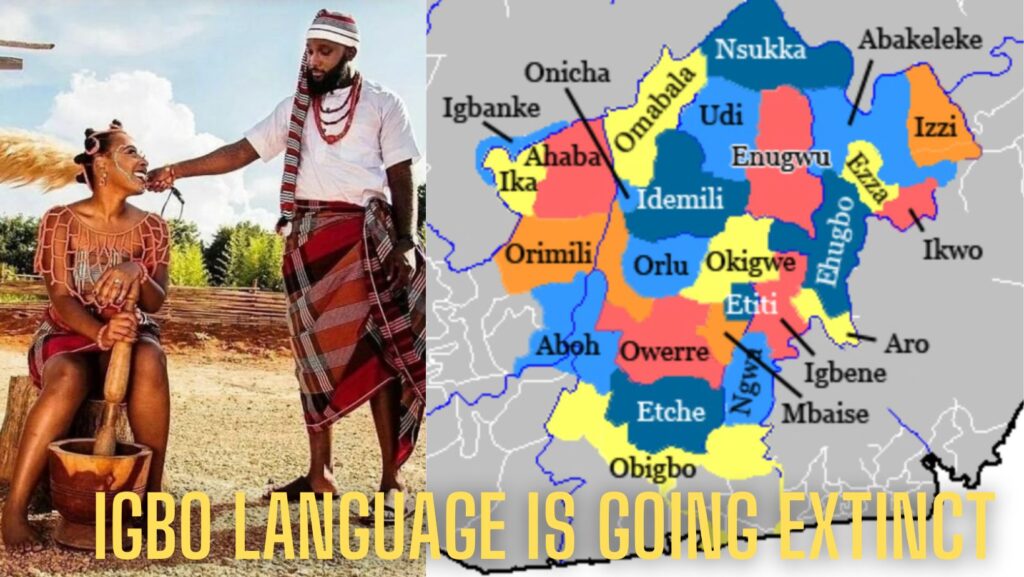
Introduction:
Language extinction is a phenomenon that has occurred throughout history, and it continues to be a reality in the modern world. One of the languages that are currently facing the threat of extinction is Igbo, a language spoken primarily in Nigeria. In this article, we will explore the reasons why Igbo, along with other Nigerian languages like Yoruba and Itshekiri, are in danger of extinction. We will also examine the impact of language extinction on communities and cultures, as well as the efforts being made to preserve endangered languages.
Igbo Language: Background and History
The Igbo language is a major West African language that is spoken by millions of people in Nigeria and other parts of the world. It is one of the four major languages in Nigeria and is spoken by the Igbo people, who are one of the largest ethnic groups in the country.
The origin of the Igbo language is still a subject of debate among historians and linguists. However, it is believed that the language may have emerged from a common ancestor with other Niger-Congo languages, and it is classified as part of the Volta-Niger branch of the Niger-Congo language family.
The Igbo language has a rich history and has played an essential role in the culture and traditions of the Igbo people. Before the arrival of Europeans in the 15th century, the Igbo people had a well-developed
system of communication that was based on their language. They had a complex system of writing that used symbols and pictograms to represent words and concepts.
However, with the arrival of Europeans and the introduction of Christianity, the Igbo language began to experience significant changes. The Christian missionaries introduced the Latin alphabet, and the Igbo language was written using the new system. The development of a written form of the Igbo language helped to preserve the language and made it possible for people to write books and other materials in the language.
Today, the Igbo language, just like some other languages in Nigeria, stands the risk of extinction, due to a couple of factors.
Language Endangerment in Nigeria
Nigeria is a country with over 250 ethnic groups, each with its own language. However, only a few of these languages have official recognition and are used in education and government. This has led to the marginalization of many languages, including Igbo, Yoruba, and Itshekiri.
The marginalization of these languages has resulted in a decline in their use, as many young people are choosing to speak English instead. This trend is particularly evident in urban areas, where English is seen as a language of prestige and social mobility. As a result, many young people are not learning their native languages, and this is leading to a loss of language proficiency among the younger generation.
Reasons for Language Extinction
There are several reasons why some Nigerian languages are facing the threat of extinction. One of the main reasons is the lack of official recognition and support for these languages. Without official recognition, these languages are not used in education and government, which reduces their prestige and leads to a decline in their use. Other reasons for the rapid and progressive extinction of the Igbo and other languages in Nigeria include:
- Colonization and Language Suppression:
The arrival of British colonialists in Nigeria in the late 19th century marked a turning point for Nigerian languages. The British introduced English as the official language of administration and education, while indigenous languages were suppressed. This has led to a decline in the use of indigenous languages over time, as English became the dominant language in Nigeria.
- Globalization:
Globalization has also played a significant role in the extinction of Nigerian languages. The rise of the internet, social media, and the entertainment industry has made English more attractive to young people. English is seen as a language of prestige, and many young people believe that proficiency in English is essential for success in modern society.
- Education:
Education plays a crucial role in language preservation. However, the Nigerian education system does not prioritize the teaching of indigenous languages. This has resulted in a decline in language proficiency among young people, who are more likely to speak English than their native language.
- Migration:
Migration is another factor that has contributed to the decline of Nigerian languages. As people move from rural to urban areas, they are exposed to new cultures and languages. Many young people, in particular, are more likely to adopt the language of their new environment and neglect their native language.
- Lack of Government Support:
The lack of government support for Nigerian languages has contributed to their rapid extinction. The Nigerian government has not made significant efforts to preserve indigenous languages, nor have they recognized the importance of these languages in promoting cultural diversity and national unity.
The rapid extinction of the Igbo language and other Nigerian languages is a significant concern. Efforts to preserve these languages must involve government support, education, and documentation. The government must recognize the importance of preserving indigenous languages and provide official support for their use in education and government. Education must also play a crucial role in preserving these languages by teaching them in schools and providing resources for their use. Documentation is also essential in preserving endangered languages. These efforts can help to preserve the history and culture of the community and ensure that future generations have access to their cultural heritage.
SOLUTIONS
- Government Support:
The Nigerian government must recognize the importance of preserving indigenous languages and provide official support for their use in education and government. This can include funding for language preservation programs, the creation of language policies, and the integration of indigenous languages into the curriculum.
- Education:
Education plays a crucial role in language preservation. The Nigerian education system must prioritize the teaching of indigenous languages, and resources should be provided to support the teaching of these languages in schools. Additionally, language immersion programs can be introduced to promote language learning and cultural awareness.
- Documentation:
Documentation is essential in preserving endangered languages. Efforts must be made to record oral histories and create written records of the language. This can include the creation of language archives and the use of technology to preserve language data.
- Community Support:
Community support is critical in preserving endangered languages. Efforts must be made to engage with communities and involve them in language preservation initiatives. This can include the creation of language preservation committees, language camps, and cultural events that celebrate indigenous languages.
- Promotion of Cultural Diversity:
The promotion of cultural diversity is essential in preserving indigenous languages. The Nigerian government must recognize the importance of cultural diversity and encourage the celebration of indigenous languages and cultures. This can include the promotion of language and cultural festivals, the inclusion of indigenous languages in the media, and the support of cultural institutions.
In conclusion, the rapid extinction of the Igbo language and other Nigerian languages is a significant concern. Efforts to preserve these languages must involve government support, education, documentation, community support, and the promotion of cultural diversity. It is the responsibility of all stakeholders, including the government, educators, and communities, to ensure that these languages are preserved for future generations.
-Writer: Oche Anejo-







